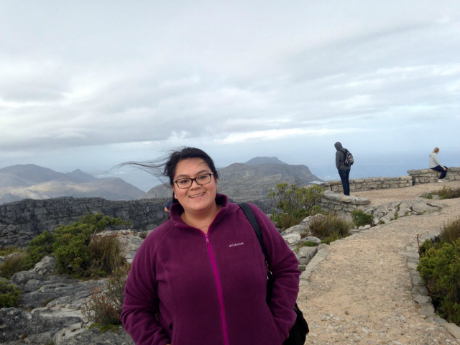With support from the PAF Professional and Development Fund, I had the opportunity to meet with high-level officials in South Africa as part of a study abroad for my degree program in the Graduate School of Political Management. My program, Advocacy in the Global Environment, requires students to participate in four short-term study abroad trips called “Global Perspective Residencies.” Prior to traveling to the country, we study its political and governmental landscape in order to understand plausible advocacy strategies. The three-credit course culminates in a one-week trip to the country of study during which we meet with leaders from the public sector, private sector, media, and NGO community.
As part of my pre-departure coursework, I studied the histories of HIV/AIDS and xenophobia, and their implications for advocacy work. Due to a spotty public sector response to the HIV/AIDS epidemic in the early 2000s, corporations led the initiation of numerous public-private sector partnerships. When meeting with the president of the Chamber of Mines, I questioned our speaker on the nature of these collaborations. Hearing about the widespread impact these programs had made me more interested in researching public-private partnerships within the United States and the potential they have to help tackle complex challenges.
I also investigated the impact of xenophobia. Following the end of apartheid and given the country’s relative economic and political stability, South Africa became a prime destination for emigrants from nearby countries. However, immigration has continued despite the economy stagnating. This has led to an increase in the number of attacks against African immigrants. The ongoing tension between local South Africans and immigrants for jobs and resources is shaping political rhetoric in the country.
Although this issue did not arise through any of our academic meetings, I was able to gain crucial insight on the situation through the performing arts. I attended a play based on a book that told the story of a Somalian immigrant and the various challenges he faced in South Africa. On our way back from the performance, our Uber driver shared with us his experience as a Zimbabwean immigrant and how difficult it had been for him move there and establish a reliable income. These experiences combined demonstrated to me how real the issue is, and forced me to consider the implications of xenophobic rhetoric within the United States.
The most rewarding aspect of this trip was interacting with our local guides, two South African college students who had received private scholarships to participate with us. Through numerous conversations, I had the chance to understand the country through their eyes. The conversations were essential in not only shaping my own knowledge, but also comparing their thoughts against those of the professionals with whom we met. As a foreigner coming in to meet with specialists, it is easy to lose sight of how every-day South Africans perceive their government – an important tool in understanding how to advocate for change. Of all the people I met, including CEOs of a major mining company, a minister of the presidential cabinet, a member of parliament from the opposition party, and a former political prisoner detained at Robben Island, it was these two students who best illustrated for me the importance of understanding on-the-ground political sentiment and culture.




